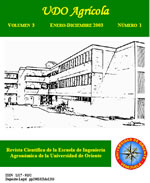
|
Revista Científica UDO Agrícola
Universidad de Oriente Press
ISSN: 1317-9152
Vol. 3, No. 1, 2003, pp. 1-11
|
 Bioline Code: cg03001
Bioline Code: cg03001
Full paper language: Spanish
Document type: Research Article
Document available free of charge
|
|
|
Revista Científica UDO Agrícola, Vol. 3, No. 1, 2003, pp. 1-11
| es |
Biotecnología: Ventajas y Desventajas Para la Agricultura
Sánchez-Cuevas, Maria Claudia
Resumen
En la actualidad estamos en la llamada "Era Biotecnológica", basada en la genética molecular. La era biotecnológica ya ha dado frutos iniciales espectaculares y se esperan grandes innovaciones a corto plazo, con grandes repercusiones comerciales. La biotecnología es toda aplicación tecnológica que utilice sistemas biológicos y organismos vivos o sus derivados para la creación o modificación de productos o procesos para usos específicos. La ingeniería genética ha permitido identificar y aislar genes específicos del ADN en el organismo donante mediante enzimas de restricción que actúan como "tijeras químicas", transferir el gen aislado del ADN del organismo receptor mediante enzimas, logrando que el organismo receptor decodifique la nueva información y produzca una nueva proteína que le va a permitir adquirir una nueva propiedad o rasgo. Hasta el presente se han producido plantas resistentes a insectos-plaga y patógenos; mejores productos, como frutos con prolongado período de almacenamiento; productos con mejores propiedades nutritivas, como un mayor contenido de proteínas, aceites, aminoácidos, etc.; y con mejoras industriales, como un mayor contenido de sólidos de los frutos. En general, los agricultores que han empezado a sembrar cultivos transgénicos están satisfechos. El área sembrada con cultivos transgénicos también se ha incrementado rápidamente. La extensión sembrada en 1999 (27,8 millones de ha) sufrió un 44% de aumento en un año. Los ecólogos y biólogos señalan que la introducción de genes de especies no relacionadas no es lo mismo que el mejoramiento tradicional, pues se saltan barreras naturales y se crean combinaciones que no existen en la naturaleza, dando lugar a individuos "artificiales", que violan las leyes naturales que impiden el cruzamiento entre organismos biológicamente diferentes. Los biotecnólogos indican que la ingeniería genética es una técnica precisa, pues se introduce ADN bien caracterizado, mientras que en el mejoramiento tradicional se transfiere el carácter buscado junto con mucho material genético sin caracterizar, del que se desconocen sus impactos. Los datos preliminares sobre el uso de cultivos transgénicos de "primera generación" señalan que los caracteres adquiridos permiten incrementar la productividad a nivel de campo, bien sea reduciendo los insumos requeridos o aumentando los rendimientos.
Palabras-clave
Biotecnología, ingeniería genética, plantas transgénicas.
|
| |
| en |
Biotechnology: Advantages and Disadvantages for Agriculture
Sánchez-Cuevas, Maria Claudia
Abstract
At the present, we are in the "Biotechnological Era" based on the molecular genetics. It has already given spectacular initial successes and short term big innovations are expected, with huge commercial repercussions. The biotechnology is all technological application that uses biological systems and alive organisms or its derivates for the creation or modification of products or processes for specific uses. The genetic engineering has allowed to identify and to isolate specific genes of the DNA in the donating organism by means of restriction enzymes that act as "chemical scissor", to transfer the isolated gene of the DNA of receiving organism by means of enzymes, achieving that receiving organism decodes the new information and produces a new protein that will allow it to acquire a new trait or feature. So far, resistant plants to insects and pathogen have been produced; better products, as fruits with lingering period of storage; products with better nutritious properties, as a bigger content of proteins, oils, amino acids, etc.; and with industrial improvements, as a bigger content of fruit solids. In general, farmers that have begun to sow transgenic crops are satisfied. The area sowed with transgenic crops has also been increased quickly. The extension sowed in 1999 (27.8 millions ha) increased to 44% in one year. The ecologists and biologists point out that the introduction of genes of non related species is not the same that the traditional breeding, because natural barriers are jumped and combinations are created that don't exist previously in the nature, giving place to "artificial" individuals that violate natural laws that impede the crossing among biologically different organisms. Biotechnologists point out that the genetic engineering is a precise technique, because well characterized DNA is introduced, while in the traditional breeding, the desirable character is transferred together with much material genetic without characterizing, of which their impacts are unknown. The preliminary data about the use of transgenic crops of "first generation" indicate that acquired traits allow them to boost the productivity at field level, well be reducing the required inputs or increasing yields.
Keywords
Biotechnology, genetic engineering, transgenic plants
|
| |
© Copyright 2003 - Revista Científica UDO Agrícola
Alternative site location: http://www.udoagricola.orgfree.com
|
|
